Logistics Report: Factors Affecting Air Cargo Growth in the UK
VerifiedAdded on 2023/03/17
|13
|3767
|85
Report
AI Summary
This report examines the factors influencing air cargo growth in the UK, comparing them to other major air cargo hubs. It identifies infrastructural development, political stability, and trade liberalization as key drivers, while fuel prices, government policies, and foreign competition hinder growth. The report contrasts the UK's situation with hubs like Dubai, highlighting differences in fuel costs, environmental policies, and geographical advantages. Challenges such as security filings and e-commerce glut are also discussed. This analysis provides a comprehensive overview of the air cargo industry's dynamics and its future prospects. Desklib is your go-to resource for similar solved assignments and past papers.
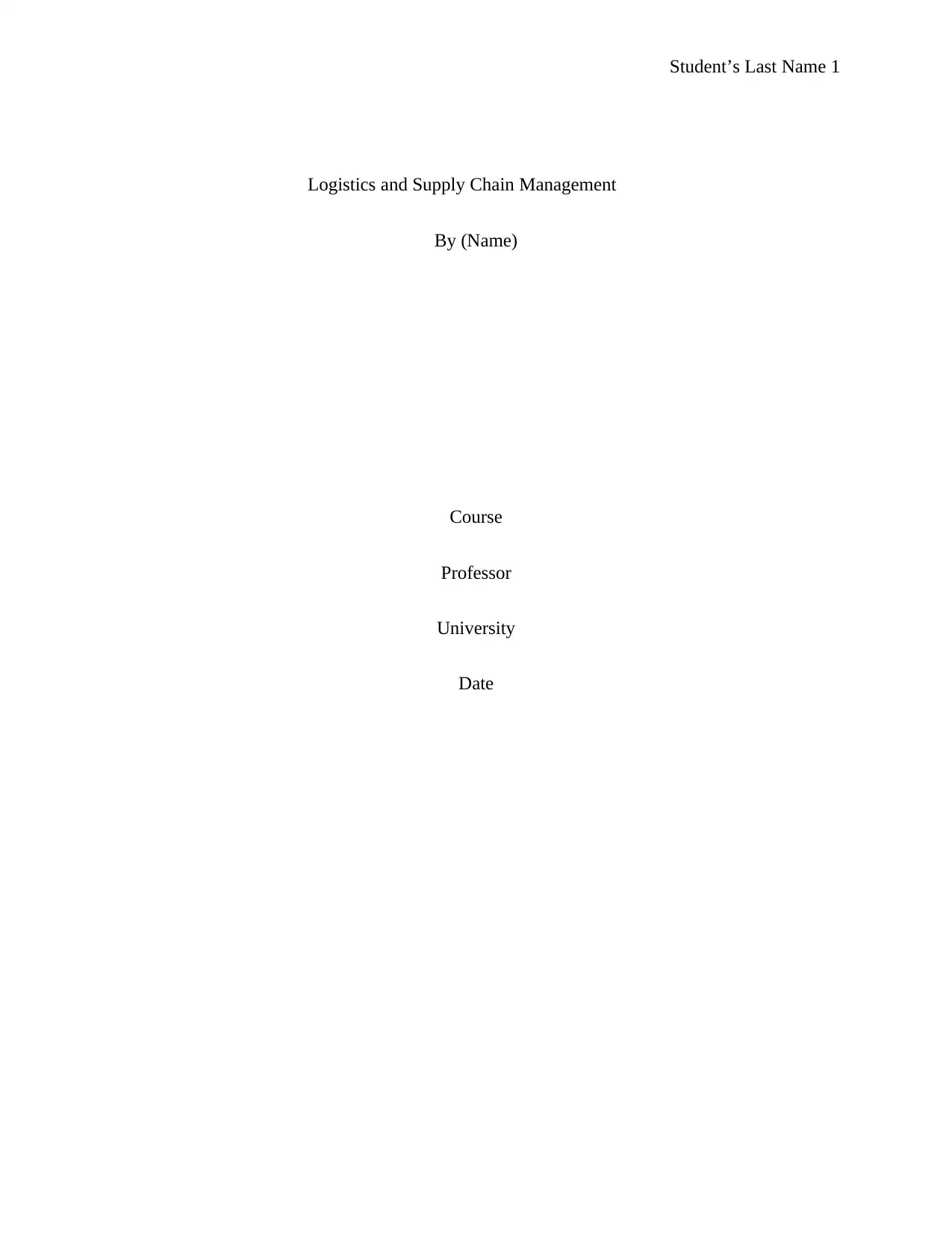
Student’s Last Name 1
Logistics and Supply Chain Management
By (Name)
Course
Professor
University
Date
Logistics and Supply Chain Management
By (Name)
Course
Professor
University
Date
Paraphrase This Document
Need a fresh take? Get an instant paraphrase of this document with our AI Paraphraser
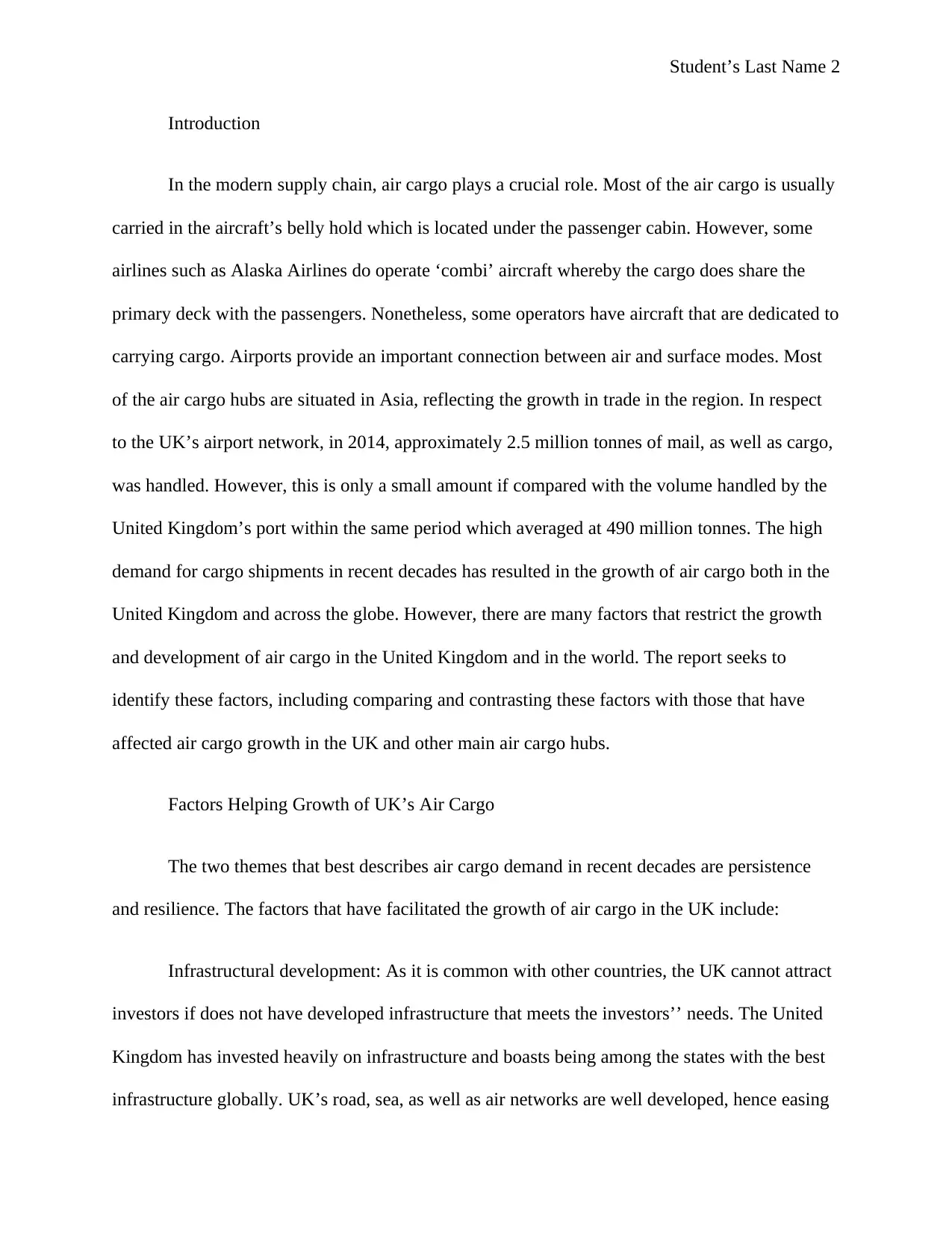
Student’s Last Name 2
Introduction
In the modern supply chain, air cargo plays a crucial role. Most of the air cargo is usually
carried in the aircraft’s belly hold which is located under the passenger cabin. However, some
airlines such as Alaska Airlines do operate ‘combi’ aircraft whereby the cargo does share the
primary deck with the passengers. Nonetheless, some operators have aircraft that are dedicated to
carrying cargo. Airports provide an important connection between air and surface modes. Most
of the air cargo hubs are situated in Asia, reflecting the growth in trade in the region. In respect
to the UK’s airport network, in 2014, approximately 2.5 million tonnes of mail, as well as cargo,
was handled. However, this is only a small amount if compared with the volume handled by the
United Kingdom’s port within the same period which averaged at 490 million tonnes. The high
demand for cargo shipments in recent decades has resulted in the growth of air cargo both in the
United Kingdom and across the globe. However, there are many factors that restrict the growth
and development of air cargo in the United Kingdom and in the world. The report seeks to
identify these factors, including comparing and contrasting these factors with those that have
affected air cargo growth in the UK and other main air cargo hubs.
Factors Helping Growth of UK’s Air Cargo
The two themes that best describes air cargo demand in recent decades are persistence
and resilience. The factors that have facilitated the growth of air cargo in the UK include:
Infrastructural development: As it is common with other countries, the UK cannot attract
investors if does not have developed infrastructure that meets the investors’’ needs. The United
Kingdom has invested heavily on infrastructure and boasts being among the states with the best
infrastructure globally. UK’s road, sea, as well as air networks are well developed, hence easing
Introduction
In the modern supply chain, air cargo plays a crucial role. Most of the air cargo is usually
carried in the aircraft’s belly hold which is located under the passenger cabin. However, some
airlines such as Alaska Airlines do operate ‘combi’ aircraft whereby the cargo does share the
primary deck with the passengers. Nonetheless, some operators have aircraft that are dedicated to
carrying cargo. Airports provide an important connection between air and surface modes. Most
of the air cargo hubs are situated in Asia, reflecting the growth in trade in the region. In respect
to the UK’s airport network, in 2014, approximately 2.5 million tonnes of mail, as well as cargo,
was handled. However, this is only a small amount if compared with the volume handled by the
United Kingdom’s port within the same period which averaged at 490 million tonnes. The high
demand for cargo shipments in recent decades has resulted in the growth of air cargo both in the
United Kingdom and across the globe. However, there are many factors that restrict the growth
and development of air cargo in the United Kingdom and in the world. The report seeks to
identify these factors, including comparing and contrasting these factors with those that have
affected air cargo growth in the UK and other main air cargo hubs.
Factors Helping Growth of UK’s Air Cargo
The two themes that best describes air cargo demand in recent decades are persistence
and resilience. The factors that have facilitated the growth of air cargo in the UK include:
Infrastructural development: As it is common with other countries, the UK cannot attract
investors if does not have developed infrastructure that meets the investors’’ needs. The United
Kingdom has invested heavily on infrastructure and boasts being among the states with the best
infrastructure globally. UK’s road, sea, as well as air networks are well developed, hence easing
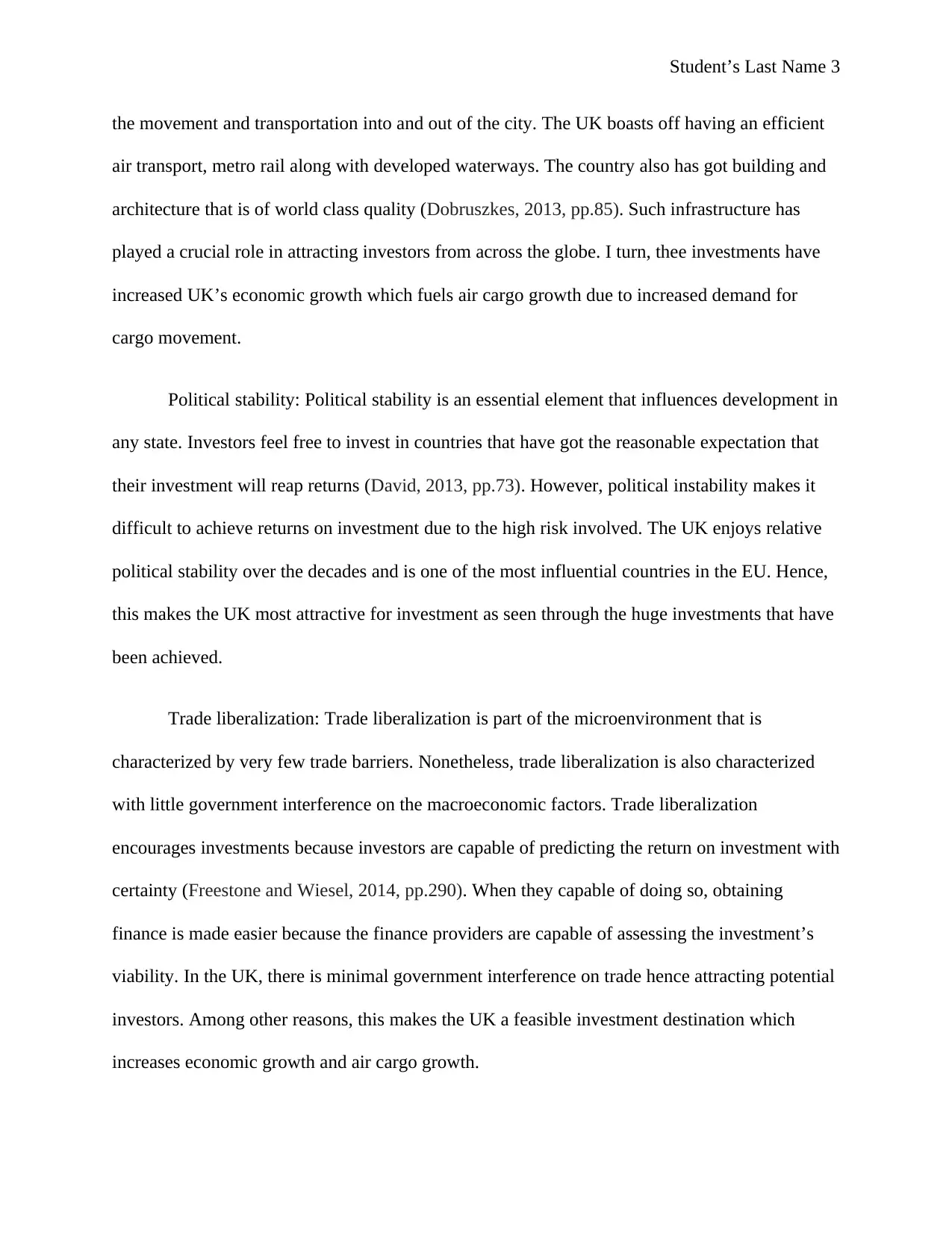
Student’s Last Name 3
the movement and transportation into and out of the city. The UK boasts off having an efficient
air transport, metro rail along with developed waterways. The country also has got building and
architecture that is of world class quality (Dobruszkes, 2013, pp.85). Such infrastructure has
played a crucial role in attracting investors from across the globe. I turn, thee investments have
increased UK’s economic growth which fuels air cargo growth due to increased demand for
cargo movement.
Political stability: Political stability is an essential element that influences development in
any state. Investors feel free to invest in countries that have got the reasonable expectation that
their investment will reap returns (David, 2013, pp.73). However, political instability makes it
difficult to achieve returns on investment due to the high risk involved. The UK enjoys relative
political stability over the decades and is one of the most influential countries in the EU. Hence,
this makes the UK most attractive for investment as seen through the huge investments that have
been achieved.
Trade liberalization: Trade liberalization is part of the microenvironment that is
characterized by very few trade barriers. Nonetheless, trade liberalization is also characterized
with little government interference on the macroeconomic factors. Trade liberalization
encourages investments because investors are capable of predicting the return on investment with
certainty (Freestone and Wiesel, 2014, pp.290). When they capable of doing so, obtaining
finance is made easier because the finance providers are capable of assessing the investment’s
viability. In the UK, there is minimal government interference on trade hence attracting potential
investors. Among other reasons, this makes the UK a feasible investment destination which
increases economic growth and air cargo growth.
the movement and transportation into and out of the city. The UK boasts off having an efficient
air transport, metro rail along with developed waterways. The country also has got building and
architecture that is of world class quality (Dobruszkes, 2013, pp.85). Such infrastructure has
played a crucial role in attracting investors from across the globe. I turn, thee investments have
increased UK’s economic growth which fuels air cargo growth due to increased demand for
cargo movement.
Political stability: Political stability is an essential element that influences development in
any state. Investors feel free to invest in countries that have got the reasonable expectation that
their investment will reap returns (David, 2013, pp.73). However, political instability makes it
difficult to achieve returns on investment due to the high risk involved. The UK enjoys relative
political stability over the decades and is one of the most influential countries in the EU. Hence,
this makes the UK most attractive for investment as seen through the huge investments that have
been achieved.
Trade liberalization: Trade liberalization is part of the microenvironment that is
characterized by very few trade barriers. Nonetheless, trade liberalization is also characterized
with little government interference on the macroeconomic factors. Trade liberalization
encourages investments because investors are capable of predicting the return on investment with
certainty (Freestone and Wiesel, 2014, pp.290). When they capable of doing so, obtaining
finance is made easier because the finance providers are capable of assessing the investment’s
viability. In the UK, there is minimal government interference on trade hence attracting potential
investors. Among other reasons, this makes the UK a feasible investment destination which
increases economic growth and air cargo growth.
⊘ This is a preview!⊘
Do you want full access?
Subscribe today to unlock all pages.

Trusted by 1+ million students worldwide
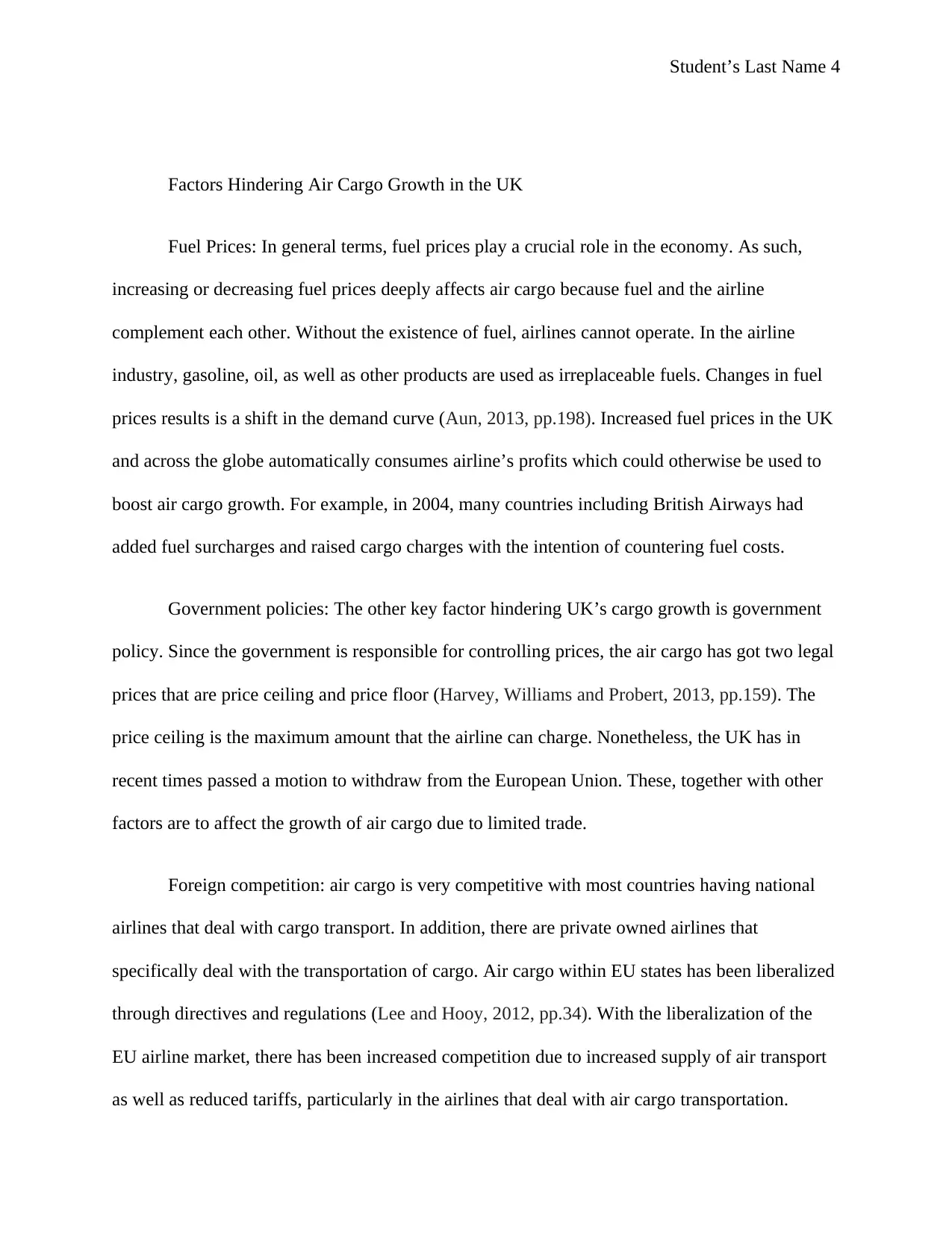
Student’s Last Name 4
Factors Hindering Air Cargo Growth in the UK
Fuel Prices: In general terms, fuel prices play a crucial role in the economy. As such,
increasing or decreasing fuel prices deeply affects air cargo because fuel and the airline
complement each other. Without the existence of fuel, airlines cannot operate. In the airline
industry, gasoline, oil, as well as other products are used as irreplaceable fuels. Changes in fuel
prices results is a shift in the demand curve (Aun, 2013, pp.198). Increased fuel prices in the UK
and across the globe automatically consumes airline’s profits which could otherwise be used to
boost air cargo growth. For example, in 2004, many countries including British Airways had
added fuel surcharges and raised cargo charges with the intention of countering fuel costs.
Government policies: The other key factor hindering UK’s cargo growth is government
policy. Since the government is responsible for controlling prices, the air cargo has got two legal
prices that are price ceiling and price floor (Harvey, Williams and Probert, 2013, pp.159). The
price ceiling is the maximum amount that the airline can charge. Nonetheless, the UK has in
recent times passed a motion to withdraw from the European Union. These, together with other
factors are to affect the growth of air cargo due to limited trade.
Foreign competition: air cargo is very competitive with most countries having national
airlines that deal with cargo transport. In addition, there are private owned airlines that
specifically deal with the transportation of cargo. Air cargo within EU states has been liberalized
through directives and regulations (Lee and Hooy, 2012, pp.34). With the liberalization of the
EU airline market, there has been increased competition due to increased supply of air transport
as well as reduced tariffs, particularly in the airlines that deal with air cargo transportation.
Factors Hindering Air Cargo Growth in the UK
Fuel Prices: In general terms, fuel prices play a crucial role in the economy. As such,
increasing or decreasing fuel prices deeply affects air cargo because fuel and the airline
complement each other. Without the existence of fuel, airlines cannot operate. In the airline
industry, gasoline, oil, as well as other products are used as irreplaceable fuels. Changes in fuel
prices results is a shift in the demand curve (Aun, 2013, pp.198). Increased fuel prices in the UK
and across the globe automatically consumes airline’s profits which could otherwise be used to
boost air cargo growth. For example, in 2004, many countries including British Airways had
added fuel surcharges and raised cargo charges with the intention of countering fuel costs.
Government policies: The other key factor hindering UK’s cargo growth is government
policy. Since the government is responsible for controlling prices, the air cargo has got two legal
prices that are price ceiling and price floor (Harvey, Williams and Probert, 2013, pp.159). The
price ceiling is the maximum amount that the airline can charge. Nonetheless, the UK has in
recent times passed a motion to withdraw from the European Union. These, together with other
factors are to affect the growth of air cargo due to limited trade.
Foreign competition: air cargo is very competitive with most countries having national
airlines that deal with cargo transport. In addition, there are private owned airlines that
specifically deal with the transportation of cargo. Air cargo within EU states has been liberalized
through directives and regulations (Lee and Hooy, 2012, pp.34). With the liberalization of the
EU airline market, there has been increased competition due to increased supply of air transport
as well as reduced tariffs, particularly in the airlines that deal with air cargo transportation.
Paraphrase This Document
Need a fresh take? Get an instant paraphrase of this document with our AI Paraphraser
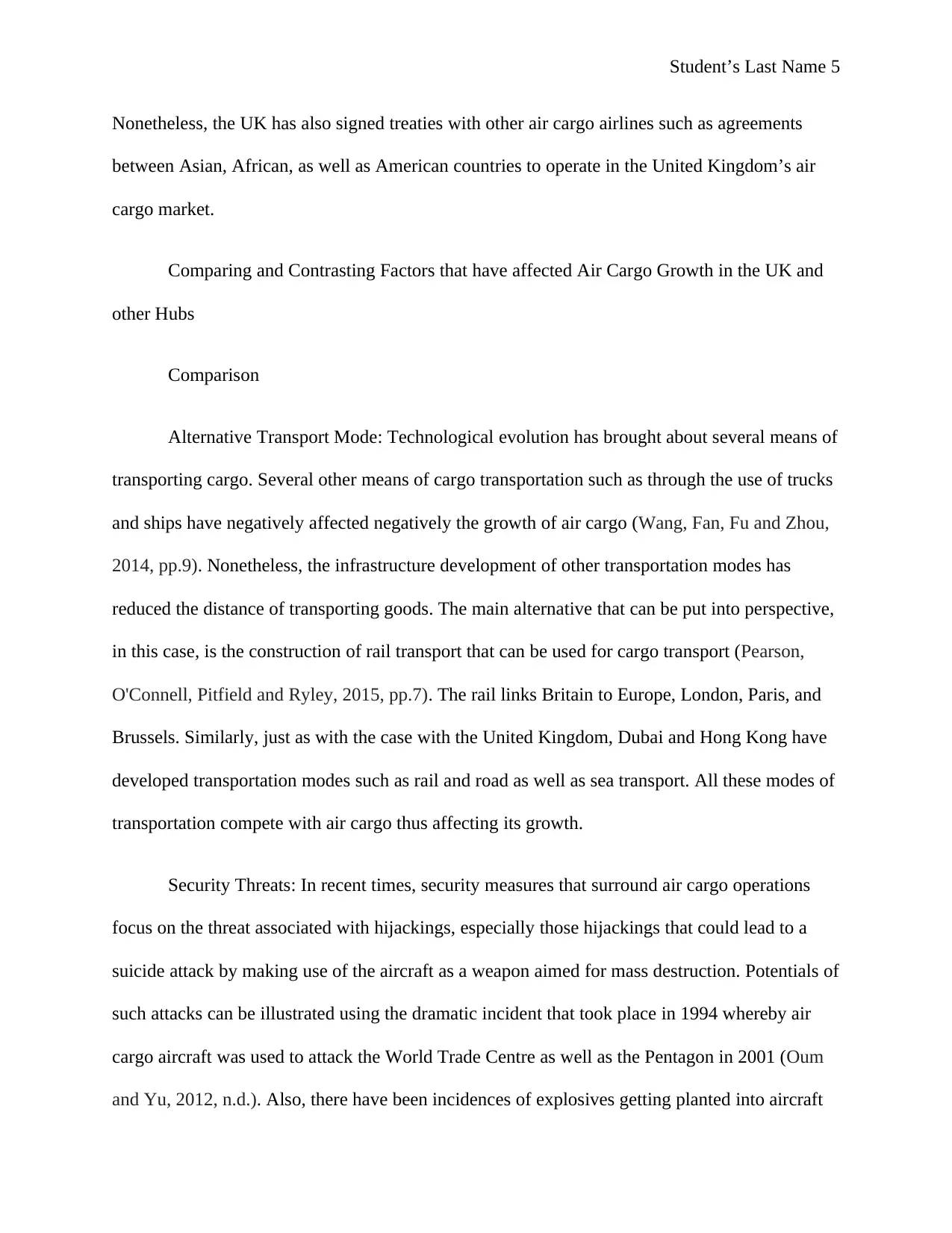
Student’s Last Name 5
Nonetheless, the UK has also signed treaties with other air cargo airlines such as agreements
between Asian, African, as well as American countries to operate in the United Kingdom’s air
cargo market.
Comparing and Contrasting Factors that have affected Air Cargo Growth in the UK and
other Hubs
Comparison
Alternative Transport Mode: Technological evolution has brought about several means of
transporting cargo. Several other means of cargo transportation such as through the use of trucks
and ships have negatively affected negatively the growth of air cargo (Wang, Fan, Fu and Zhou,
2014, pp.9). Nonetheless, the infrastructure development of other transportation modes has
reduced the distance of transporting goods. The main alternative that can be put into perspective,
in this case, is the construction of rail transport that can be used for cargo transport (Pearson,
O'Connell, Pitfield and Ryley, 2015, pp.7). The rail links Britain to Europe, London, Paris, and
Brussels. Similarly, just as with the case with the United Kingdom, Dubai and Hong Kong have
developed transportation modes such as rail and road as well as sea transport. All these modes of
transportation compete with air cargo thus affecting its growth.
Security Threats: In recent times, security measures that surround air cargo operations
focus on the threat associated with hijackings, especially those hijackings that could lead to a
suicide attack by making use of the aircraft as a weapon aimed for mass destruction. Potentials of
such attacks can be illustrated using the dramatic incident that took place in 1994 whereby air
cargo aircraft was used to attack the World Trade Centre as well as the Pentagon in 2001 (Oum
and Yu, 2012, n.d.). Also, there have been incidences of explosives getting planted into aircraft
Nonetheless, the UK has also signed treaties with other air cargo airlines such as agreements
between Asian, African, as well as American countries to operate in the United Kingdom’s air
cargo market.
Comparing and Contrasting Factors that have affected Air Cargo Growth in the UK and
other Hubs
Comparison
Alternative Transport Mode: Technological evolution has brought about several means of
transporting cargo. Several other means of cargo transportation such as through the use of trucks
and ships have negatively affected negatively the growth of air cargo (Wang, Fan, Fu and Zhou,
2014, pp.9). Nonetheless, the infrastructure development of other transportation modes has
reduced the distance of transporting goods. The main alternative that can be put into perspective,
in this case, is the construction of rail transport that can be used for cargo transport (Pearson,
O'Connell, Pitfield and Ryley, 2015, pp.7). The rail links Britain to Europe, London, Paris, and
Brussels. Similarly, just as with the case with the United Kingdom, Dubai and Hong Kong have
developed transportation modes such as rail and road as well as sea transport. All these modes of
transportation compete with air cargo thus affecting its growth.
Security Threats: In recent times, security measures that surround air cargo operations
focus on the threat associated with hijackings, especially those hijackings that could lead to a
suicide attack by making use of the aircraft as a weapon aimed for mass destruction. Potentials of
such attacks can be illustrated using the dramatic incident that took place in 1994 whereby air
cargo aircraft was used to attack the World Trade Centre as well as the Pentagon in 2001 (Oum
and Yu, 2012, n.d.). Also, there have been incidences of explosives getting planted into aircraft
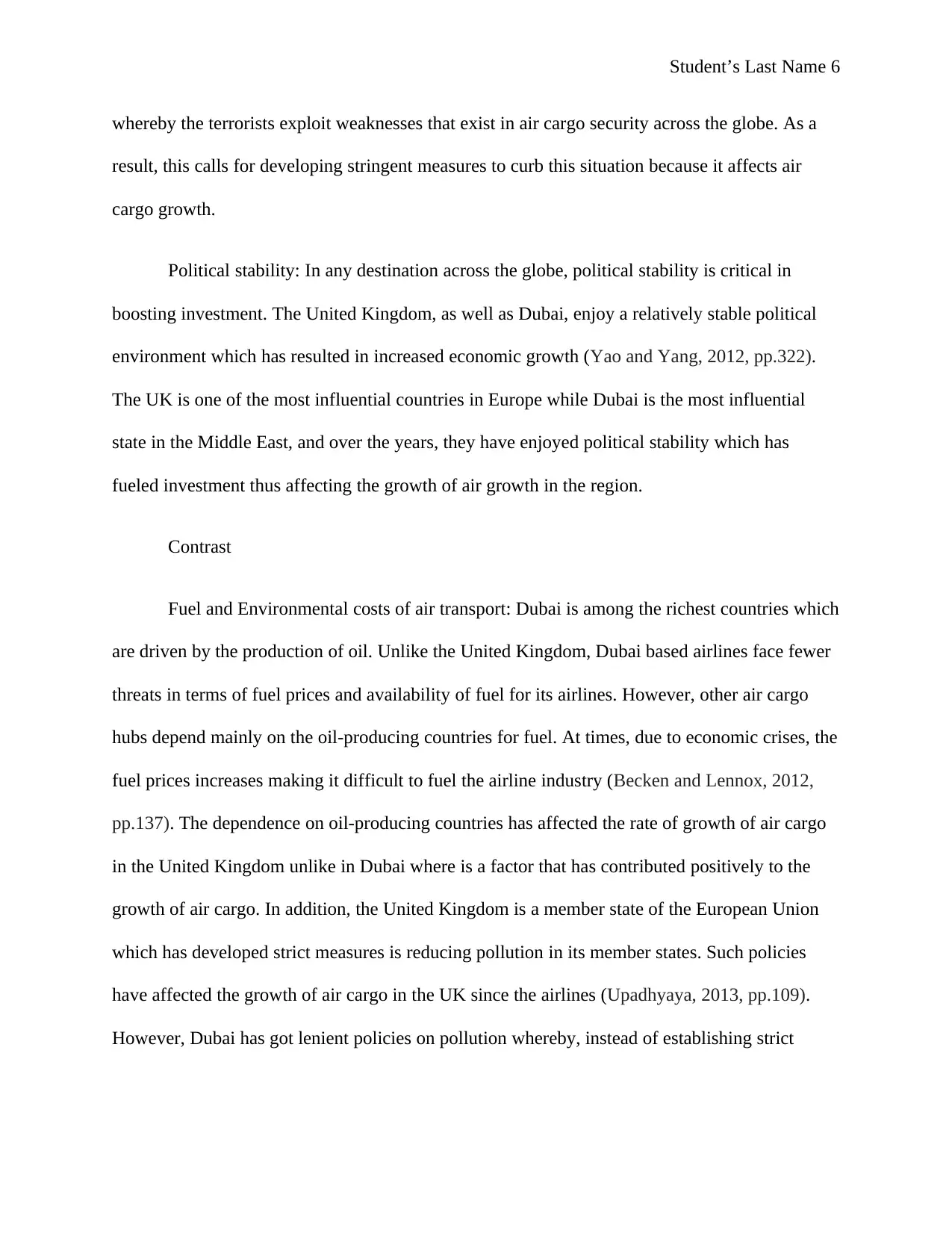
Student’s Last Name 6
whereby the terrorists exploit weaknesses that exist in air cargo security across the globe. As a
result, this calls for developing stringent measures to curb this situation because it affects air
cargo growth.
Political stability: In any destination across the globe, political stability is critical in
boosting investment. The United Kingdom, as well as Dubai, enjoy a relatively stable political
environment which has resulted in increased economic growth (Yao and Yang, 2012, pp.322).
The UK is one of the most influential countries in Europe while Dubai is the most influential
state in the Middle East, and over the years, they have enjoyed political stability which has
fueled investment thus affecting the growth of air growth in the region.
Contrast
Fuel and Environmental costs of air transport: Dubai is among the richest countries which
are driven by the production of oil. Unlike the United Kingdom, Dubai based airlines face fewer
threats in terms of fuel prices and availability of fuel for its airlines. However, other air cargo
hubs depend mainly on the oil-producing countries for fuel. At times, due to economic crises, the
fuel prices increases making it difficult to fuel the airline industry (Becken and Lennox, 2012,
pp.137). The dependence on oil-producing countries has affected the rate of growth of air cargo
in the United Kingdom unlike in Dubai where is a factor that has contributed positively to the
growth of air cargo. In addition, the United Kingdom is a member state of the European Union
which has developed strict measures is reducing pollution in its member states. Such policies
have affected the growth of air cargo in the UK since the airlines (Upadhyaya, 2013, pp.109).
However, Dubai has got lenient policies on pollution whereby, instead of establishing strict
whereby the terrorists exploit weaknesses that exist in air cargo security across the globe. As a
result, this calls for developing stringent measures to curb this situation because it affects air
cargo growth.
Political stability: In any destination across the globe, political stability is critical in
boosting investment. The United Kingdom, as well as Dubai, enjoy a relatively stable political
environment which has resulted in increased economic growth (Yao and Yang, 2012, pp.322).
The UK is one of the most influential countries in Europe while Dubai is the most influential
state in the Middle East, and over the years, they have enjoyed political stability which has
fueled investment thus affecting the growth of air growth in the region.
Contrast
Fuel and Environmental costs of air transport: Dubai is among the richest countries which
are driven by the production of oil. Unlike the United Kingdom, Dubai based airlines face fewer
threats in terms of fuel prices and availability of fuel for its airlines. However, other air cargo
hubs depend mainly on the oil-producing countries for fuel. At times, due to economic crises, the
fuel prices increases making it difficult to fuel the airline industry (Becken and Lennox, 2012,
pp.137). The dependence on oil-producing countries has affected the rate of growth of air cargo
in the United Kingdom unlike in Dubai where is a factor that has contributed positively to the
growth of air cargo. In addition, the United Kingdom is a member state of the European Union
which has developed strict measures is reducing pollution in its member states. Such policies
have affected the growth of air cargo in the UK since the airlines (Upadhyaya, 2013, pp.109).
However, Dubai has got lenient policies on pollution whereby, instead of establishing strict
⊘ This is a preview!⊘
Do you want full access?
Subscribe today to unlock all pages.

Trusted by 1+ million students worldwide
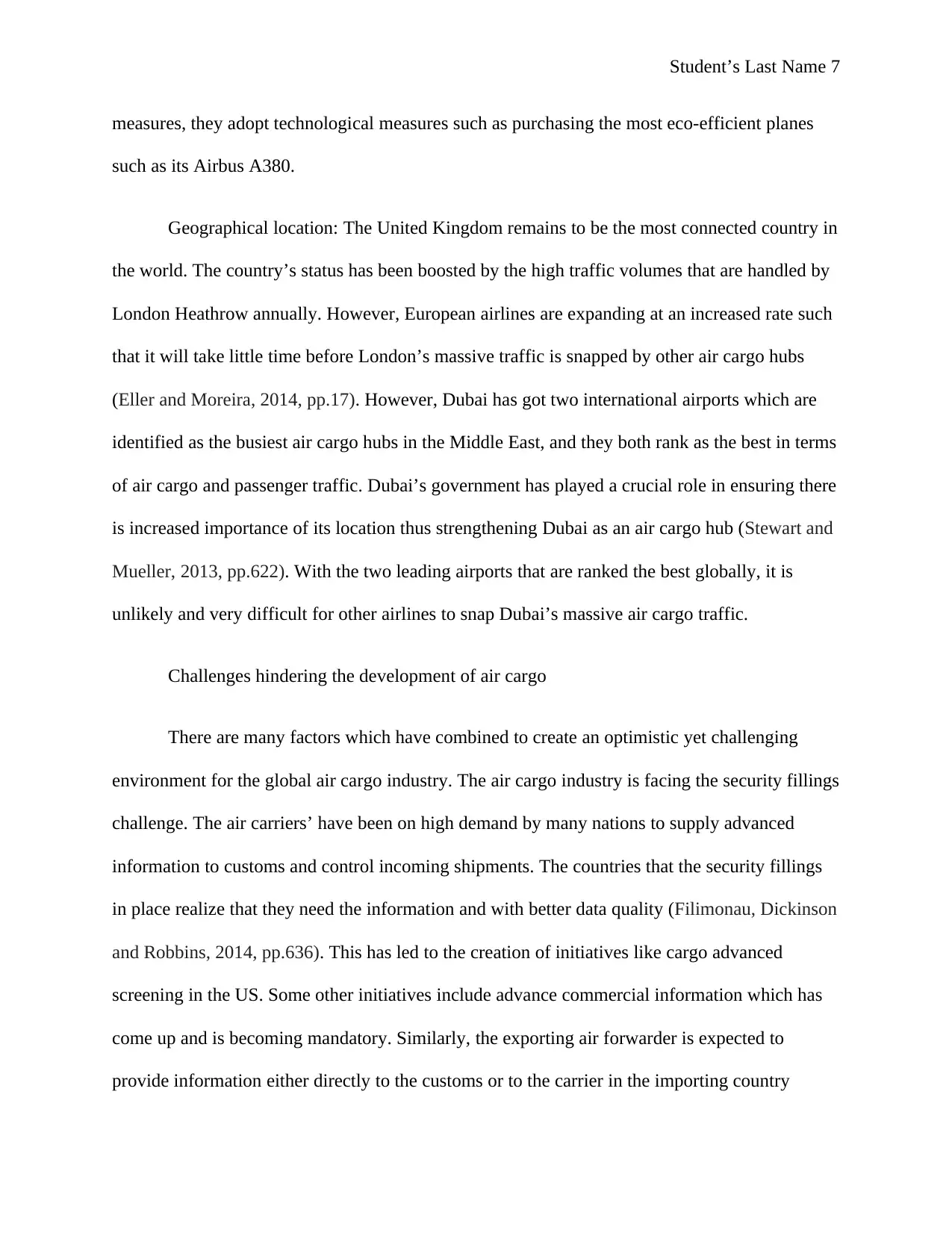
Student’s Last Name 7
measures, they adopt technological measures such as purchasing the most eco-efficient planes
such as its Airbus A380.
Geographical location: The United Kingdom remains to be the most connected country in
the world. The country’s status has been boosted by the high traffic volumes that are handled by
London Heathrow annually. However, European airlines are expanding at an increased rate such
that it will take little time before London’s massive traffic is snapped by other air cargo hubs
(Eller and Moreira, 2014, pp.17). However, Dubai has got two international airports which are
identified as the busiest air cargo hubs in the Middle East, and they both rank as the best in terms
of air cargo and passenger traffic. Dubai’s government has played a crucial role in ensuring there
is increased importance of its location thus strengthening Dubai as an air cargo hub (Stewart and
Mueller, 2013, pp.622). With the two leading airports that are ranked the best globally, it is
unlikely and very difficult for other airlines to snap Dubai’s massive air cargo traffic.
Challenges hindering the development of air cargo
There are many factors which have combined to create an optimistic yet challenging
environment for the global air cargo industry. The air cargo industry is facing the security fillings
challenge. The air carriers’ have been on high demand by many nations to supply advanced
information to customs and control incoming shipments. The countries that the security fillings
in place realize that they need the information and with better data quality (Filimonau, Dickinson
and Robbins, 2014, pp.636). This has led to the creation of initiatives like cargo advanced
screening in the US. Some other initiatives include advance commercial information which has
come up and is becoming mandatory. Similarly, the exporting air forwarder is expected to
provide information either directly to the customs or to the carrier in the importing country
measures, they adopt technological measures such as purchasing the most eco-efficient planes
such as its Airbus A380.
Geographical location: The United Kingdom remains to be the most connected country in
the world. The country’s status has been boosted by the high traffic volumes that are handled by
London Heathrow annually. However, European airlines are expanding at an increased rate such
that it will take little time before London’s massive traffic is snapped by other air cargo hubs
(Eller and Moreira, 2014, pp.17). However, Dubai has got two international airports which are
identified as the busiest air cargo hubs in the Middle East, and they both rank as the best in terms
of air cargo and passenger traffic. Dubai’s government has played a crucial role in ensuring there
is increased importance of its location thus strengthening Dubai as an air cargo hub (Stewart and
Mueller, 2013, pp.622). With the two leading airports that are ranked the best globally, it is
unlikely and very difficult for other airlines to snap Dubai’s massive air cargo traffic.
Challenges hindering the development of air cargo
There are many factors which have combined to create an optimistic yet challenging
environment for the global air cargo industry. The air cargo industry is facing the security fillings
challenge. The air carriers’ have been on high demand by many nations to supply advanced
information to customs and control incoming shipments. The countries that the security fillings
in place realize that they need the information and with better data quality (Filimonau, Dickinson
and Robbins, 2014, pp.636). This has led to the creation of initiatives like cargo advanced
screening in the US. Some other initiatives include advance commercial information which has
come up and is becoming mandatory. Similarly, the exporting air forwarder is expected to
provide information either directly to the customs or to the carrier in the importing country
Paraphrase This Document
Need a fresh take? Get an instant paraphrase of this document with our AI Paraphraser
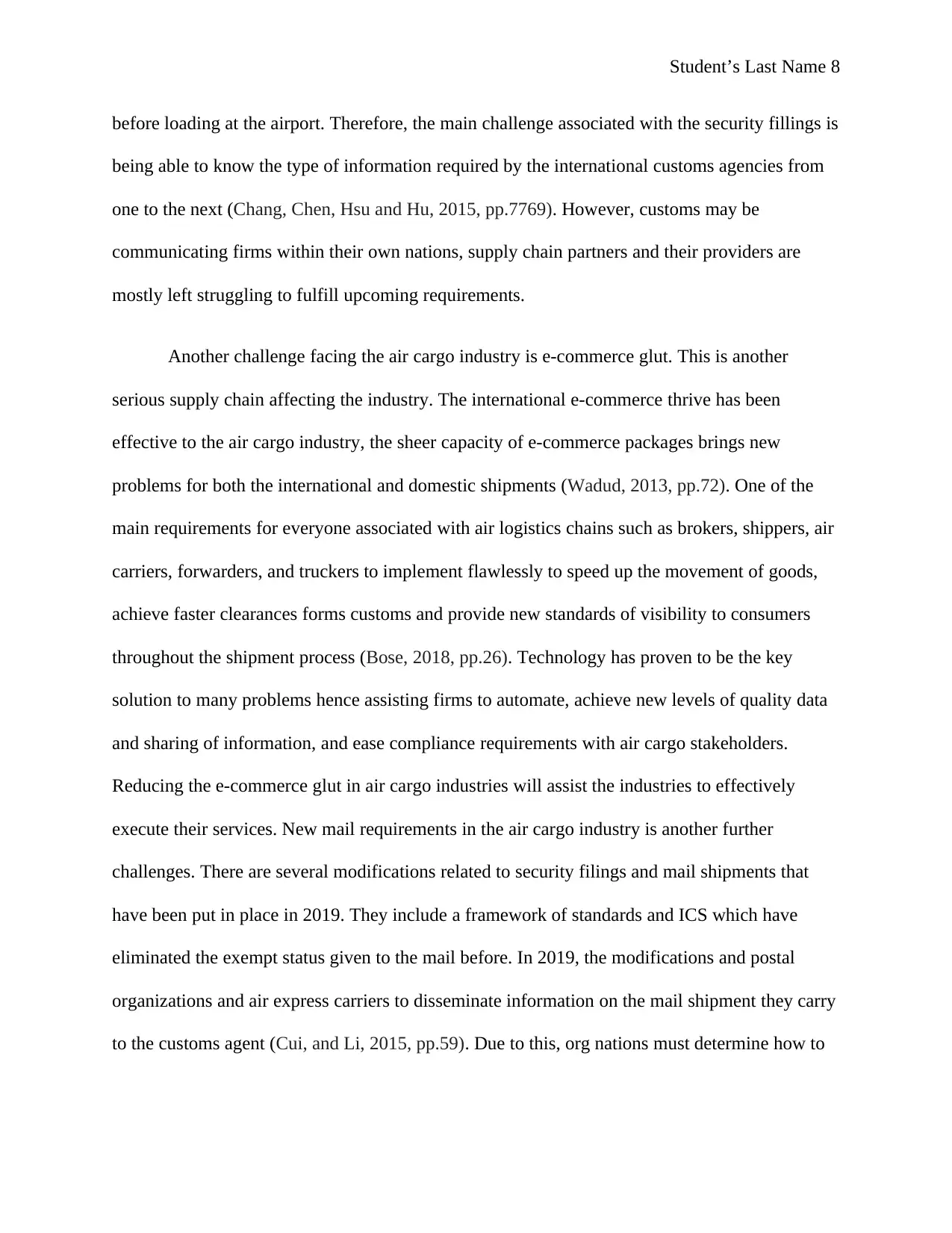
Student’s Last Name 8
before loading at the airport. Therefore, the main challenge associated with the security fillings is
being able to know the type of information required by the international customs agencies from
one to the next (Chang, Chen, Hsu and Hu, 2015, pp.7769). However, customs may be
communicating firms within their own nations, supply chain partners and their providers are
mostly left struggling to fulfill upcoming requirements.
Another challenge facing the air cargo industry is e-commerce glut. This is another
serious supply chain affecting the industry. The international e-commerce thrive has been
effective to the air cargo industry, the sheer capacity of e-commerce packages brings new
problems for both the international and domestic shipments (Wadud, 2013, pp.72). One of the
main requirements for everyone associated with air logistics chains such as brokers, shippers, air
carriers, forwarders, and truckers to implement flawlessly to speed up the movement of goods,
achieve faster clearances forms customs and provide new standards of visibility to consumers
throughout the shipment process (Bose, 2018, pp.26). Technology has proven to be the key
solution to many problems hence assisting firms to automate, achieve new levels of quality data
and sharing of information, and ease compliance requirements with air cargo stakeholders.
Reducing the e-commerce glut in air cargo industries will assist the industries to effectively
execute their services. New mail requirements in the air cargo industry is another further
challenges. There are several modifications related to security filings and mail shipments that
have been put in place in 2019. They include a framework of standards and ICS which have
eliminated the exempt status given to the mail before. In 2019, the modifications and postal
organizations and air express carriers to disseminate information on the mail shipment they carry
to the customs agent (Cui, and Li, 2015, pp.59). Due to this, org nations must determine how to
before loading at the airport. Therefore, the main challenge associated with the security fillings is
being able to know the type of information required by the international customs agencies from
one to the next (Chang, Chen, Hsu and Hu, 2015, pp.7769). However, customs may be
communicating firms within their own nations, supply chain partners and their providers are
mostly left struggling to fulfill upcoming requirements.
Another challenge facing the air cargo industry is e-commerce glut. This is another
serious supply chain affecting the industry. The international e-commerce thrive has been
effective to the air cargo industry, the sheer capacity of e-commerce packages brings new
problems for both the international and domestic shipments (Wadud, 2013, pp.72). One of the
main requirements for everyone associated with air logistics chains such as brokers, shippers, air
carriers, forwarders, and truckers to implement flawlessly to speed up the movement of goods,
achieve faster clearances forms customs and provide new standards of visibility to consumers
throughout the shipment process (Bose, 2018, pp.26). Technology has proven to be the key
solution to many problems hence assisting firms to automate, achieve new levels of quality data
and sharing of information, and ease compliance requirements with air cargo stakeholders.
Reducing the e-commerce glut in air cargo industries will assist the industries to effectively
execute their services. New mail requirements in the air cargo industry is another further
challenges. There are several modifications related to security filings and mail shipments that
have been put in place in 2019. They include a framework of standards and ICS which have
eliminated the exempt status given to the mail before. In 2019, the modifications and postal
organizations and air express carriers to disseminate information on the mail shipment they carry
to the customs agent (Cui, and Li, 2015, pp.59). Due to this, org nations must determine how to
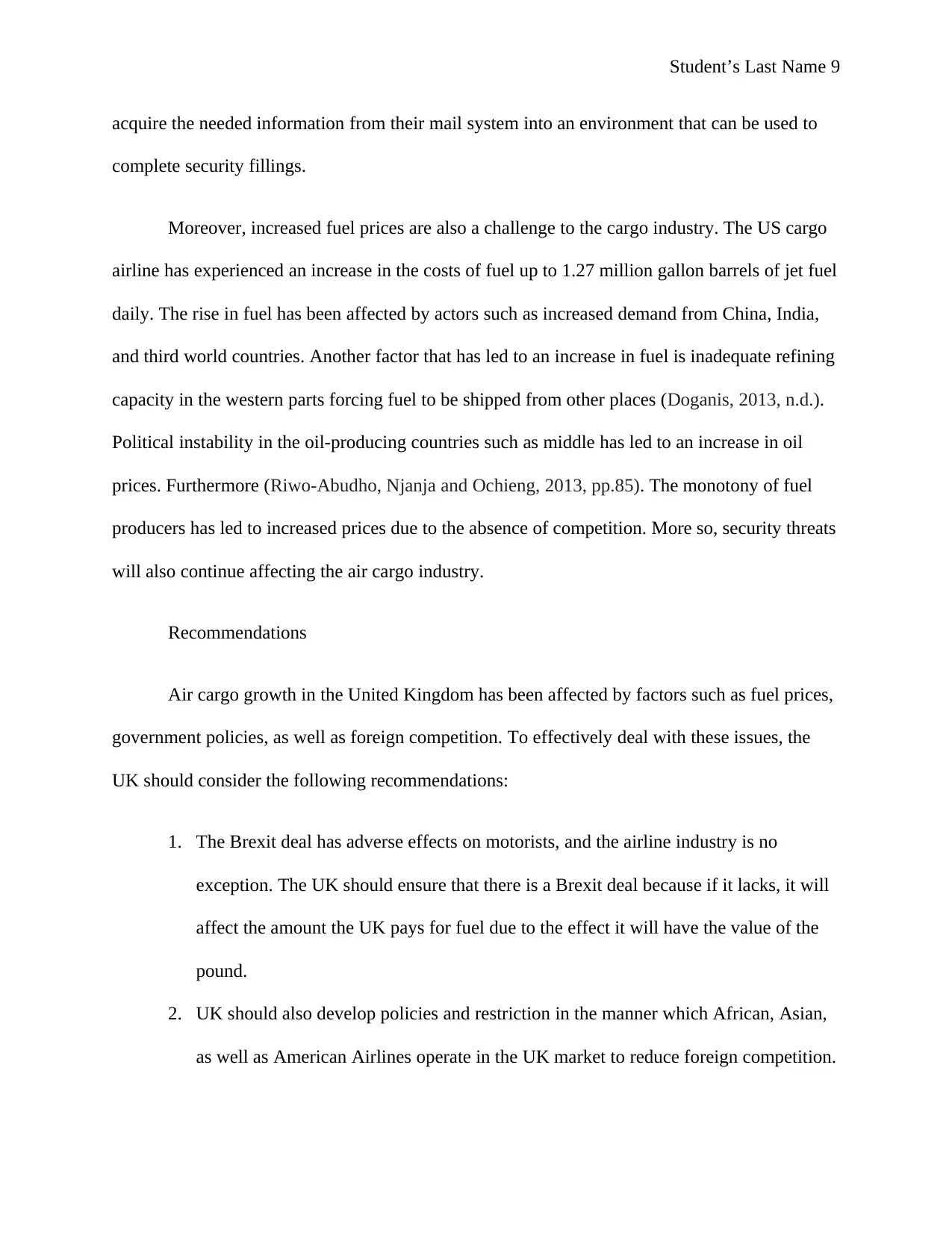
Student’s Last Name 9
acquire the needed information from their mail system into an environment that can be used to
complete security fillings.
Moreover, increased fuel prices are also a challenge to the cargo industry. The US cargo
airline has experienced an increase in the costs of fuel up to 1.27 million gallon barrels of jet fuel
daily. The rise in fuel has been affected by actors such as increased demand from China, India,
and third world countries. Another factor that has led to an increase in fuel is inadequate refining
capacity in the western parts forcing fuel to be shipped from other places (Doganis, 2013, n.d.).
Political instability in the oil-producing countries such as middle has led to an increase in oil
prices. Furthermore (Riwo-Abudho, Njanja and Ochieng, 2013, pp.85). The monotony of fuel
producers has led to increased prices due to the absence of competition. More so, security threats
will also continue affecting the air cargo industry.
Recommendations
Air cargo growth in the United Kingdom has been affected by factors such as fuel prices,
government policies, as well as foreign competition. To effectively deal with these issues, the
UK should consider the following recommendations:
1. The Brexit deal has adverse effects on motorists, and the airline industry is no
exception. The UK should ensure that there is a Brexit deal because if it lacks, it will
affect the amount the UK pays for fuel due to the effect it will have the value of the
pound.
2. UK should also develop policies and restriction in the manner which African, Asian,
as well as American Airlines operate in the UK market to reduce foreign competition.
acquire the needed information from their mail system into an environment that can be used to
complete security fillings.
Moreover, increased fuel prices are also a challenge to the cargo industry. The US cargo
airline has experienced an increase in the costs of fuel up to 1.27 million gallon barrels of jet fuel
daily. The rise in fuel has been affected by actors such as increased demand from China, India,
and third world countries. Another factor that has led to an increase in fuel is inadequate refining
capacity in the western parts forcing fuel to be shipped from other places (Doganis, 2013, n.d.).
Political instability in the oil-producing countries such as middle has led to an increase in oil
prices. Furthermore (Riwo-Abudho, Njanja and Ochieng, 2013, pp.85). The monotony of fuel
producers has led to increased prices due to the absence of competition. More so, security threats
will also continue affecting the air cargo industry.
Recommendations
Air cargo growth in the United Kingdom has been affected by factors such as fuel prices,
government policies, as well as foreign competition. To effectively deal with these issues, the
UK should consider the following recommendations:
1. The Brexit deal has adverse effects on motorists, and the airline industry is no
exception. The UK should ensure that there is a Brexit deal because if it lacks, it will
affect the amount the UK pays for fuel due to the effect it will have the value of the
pound.
2. UK should also develop policies and restriction in the manner which African, Asian,
as well as American Airlines operate in the UK market to reduce foreign competition.
⊘ This is a preview!⊘
Do you want full access?
Subscribe today to unlock all pages.

Trusted by 1+ million students worldwide
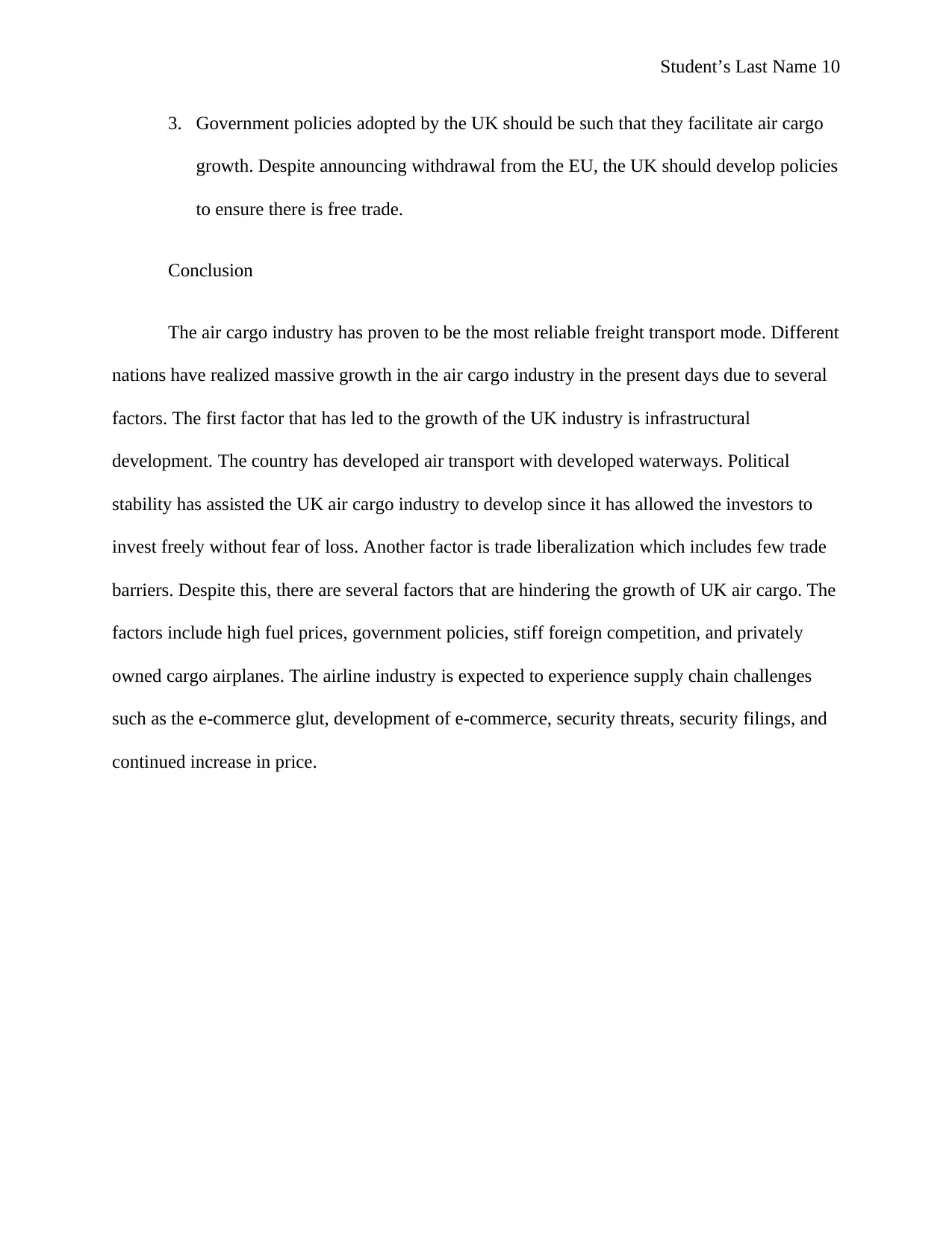
Student’s Last Name 10
3. Government policies adopted by the UK should be such that they facilitate air cargo
growth. Despite announcing withdrawal from the EU, the UK should develop policies
to ensure there is free trade.
Conclusion
The air cargo industry has proven to be the most reliable freight transport mode. Different
nations have realized massive growth in the air cargo industry in the present days due to several
factors. The first factor that has led to the growth of the UK industry is infrastructural
development. The country has developed air transport with developed waterways. Political
stability has assisted the UK air cargo industry to develop since it has allowed the investors to
invest freely without fear of loss. Another factor is trade liberalization which includes few trade
barriers. Despite this, there are several factors that are hindering the growth of UK air cargo. The
factors include high fuel prices, government policies, stiff foreign competition, and privately
owned cargo airplanes. The airline industry is expected to experience supply chain challenges
such as the e-commerce glut, development of e-commerce, security threats, security filings, and
continued increase in price.
3. Government policies adopted by the UK should be such that they facilitate air cargo
growth. Despite announcing withdrawal from the EU, the UK should develop policies
to ensure there is free trade.
Conclusion
The air cargo industry has proven to be the most reliable freight transport mode. Different
nations have realized massive growth in the air cargo industry in the present days due to several
factors. The first factor that has led to the growth of the UK industry is infrastructural
development. The country has developed air transport with developed waterways. Political
stability has assisted the UK air cargo industry to develop since it has allowed the investors to
invest freely without fear of loss. Another factor is trade liberalization which includes few trade
barriers. Despite this, there are several factors that are hindering the growth of UK air cargo. The
factors include high fuel prices, government policies, stiff foreign competition, and privately
owned cargo airplanes. The airline industry is expected to experience supply chain challenges
such as the e-commerce glut, development of e-commerce, security threats, security filings, and
continued increase in price.
Paraphrase This Document
Need a fresh take? Get an instant paraphrase of this document with our AI Paraphraser
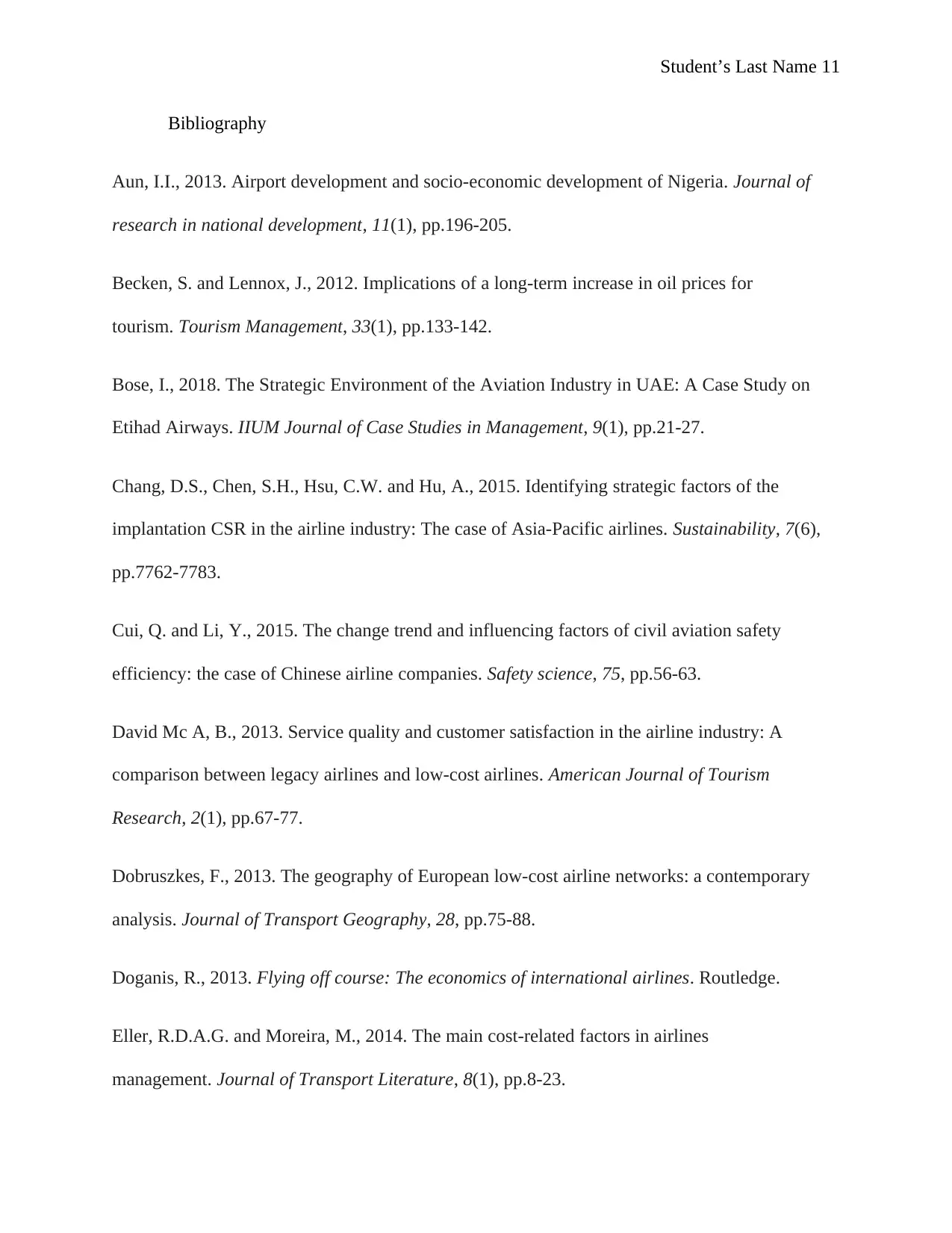
Student’s Last Name 11
Bibliography
Aun, I.I., 2013. Airport development and socio-economic development of Nigeria. Journal of
research in national development, 11(1), pp.196-205.
Becken, S. and Lennox, J., 2012. Implications of a long-term increase in oil prices for
tourism. Tourism Management, 33(1), pp.133-142.
Bose, I., 2018. The Strategic Environment of the Aviation Industry in UAE: A Case Study on
Etihad Airways. IIUM Journal of Case Studies in Management, 9(1), pp.21-27.
Chang, D.S., Chen, S.H., Hsu, C.W. and Hu, A., 2015. Identifying strategic factors of the
implantation CSR in the airline industry: The case of Asia-Pacific airlines. Sustainability, 7(6),
pp.7762-7783.
Cui, Q. and Li, Y., 2015. The change trend and influencing factors of civil aviation safety
efficiency: the case of Chinese airline companies. Safety science, 75, pp.56-63.
David Mc A, B., 2013. Service quality and customer satisfaction in the airline industry: A
comparison between legacy airlines and low-cost airlines. American Journal of Tourism
Research, 2(1), pp.67-77.
Dobruszkes, F., 2013. The geography of European low-cost airline networks: a contemporary
analysis. Journal of Transport Geography, 28, pp.75-88.
Doganis, R., 2013. Flying off course: The economics of international airlines. Routledge.
Eller, R.D.A.G. and Moreira, M., 2014. The main cost-related factors in airlines
management. Journal of Transport Literature, 8(1), pp.8-23.
Bibliography
Aun, I.I., 2013. Airport development and socio-economic development of Nigeria. Journal of
research in national development, 11(1), pp.196-205.
Becken, S. and Lennox, J., 2012. Implications of a long-term increase in oil prices for
tourism. Tourism Management, 33(1), pp.133-142.
Bose, I., 2018. The Strategic Environment of the Aviation Industry in UAE: A Case Study on
Etihad Airways. IIUM Journal of Case Studies in Management, 9(1), pp.21-27.
Chang, D.S., Chen, S.H., Hsu, C.W. and Hu, A., 2015. Identifying strategic factors of the
implantation CSR in the airline industry: The case of Asia-Pacific airlines. Sustainability, 7(6),
pp.7762-7783.
Cui, Q. and Li, Y., 2015. The change trend and influencing factors of civil aviation safety
efficiency: the case of Chinese airline companies. Safety science, 75, pp.56-63.
David Mc A, B., 2013. Service quality and customer satisfaction in the airline industry: A
comparison between legacy airlines and low-cost airlines. American Journal of Tourism
Research, 2(1), pp.67-77.
Dobruszkes, F., 2013. The geography of European low-cost airline networks: a contemporary
analysis. Journal of Transport Geography, 28, pp.75-88.
Doganis, R., 2013. Flying off course: The economics of international airlines. Routledge.
Eller, R.D.A.G. and Moreira, M., 2014. The main cost-related factors in airlines
management. Journal of Transport Literature, 8(1), pp.8-23.
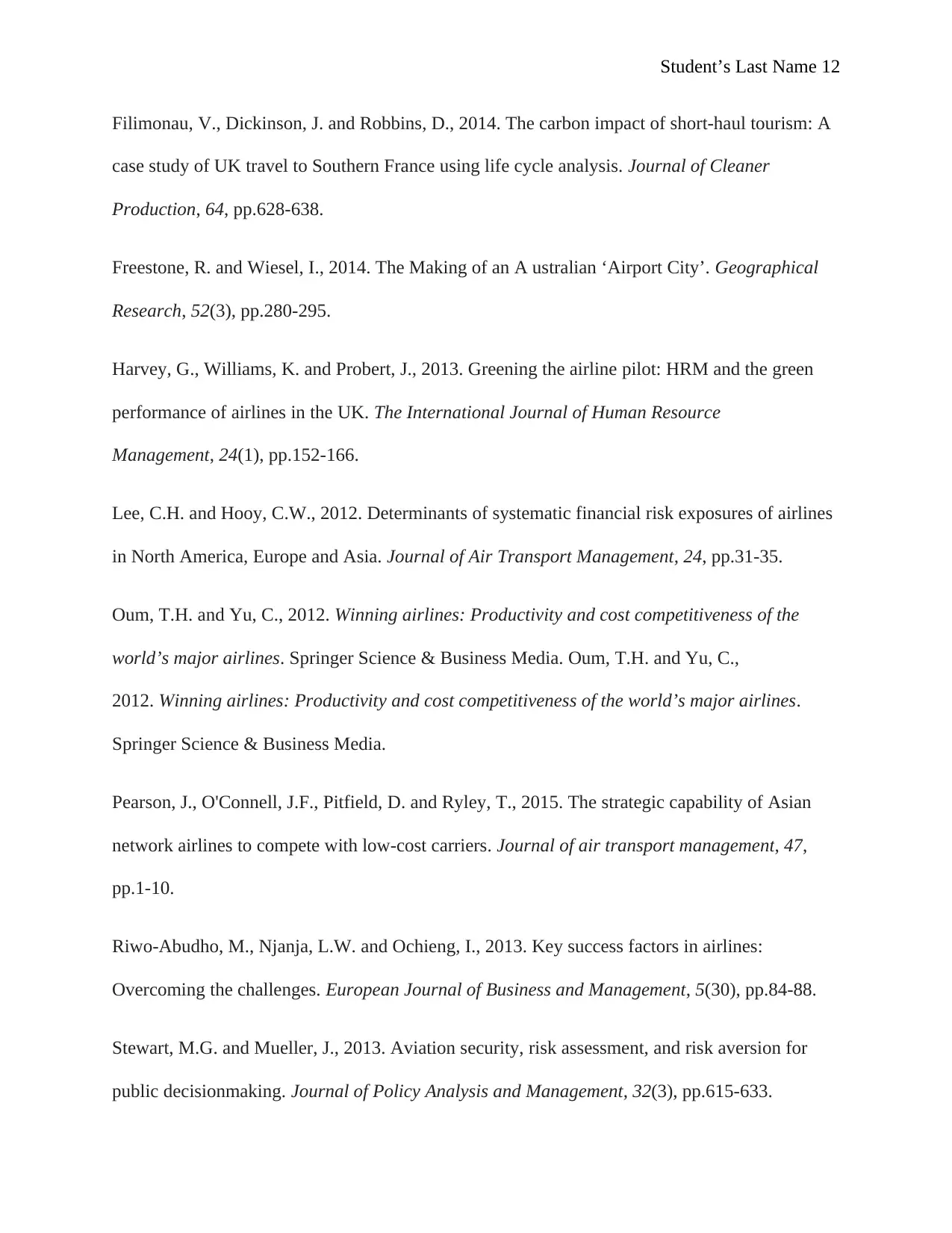
Student’s Last Name 12
Filimonau, V., Dickinson, J. and Robbins, D., 2014. The carbon impact of short-haul tourism: A
case study of UK travel to Southern France using life cycle analysis. Journal of Cleaner
Production, 64, pp.628-638.
Freestone, R. and Wiesel, I., 2014. The Making of an A ustralian ‘Airport City’. Geographical
Research, 52(3), pp.280-295.
Harvey, G., Williams, K. and Probert, J., 2013. Greening the airline pilot: HRM and the green
performance of airlines in the UK. The International Journal of Human Resource
Management, 24(1), pp.152-166.
Lee, C.H. and Hooy, C.W., 2012. Determinants of systematic financial risk exposures of airlines
in North America, Europe and Asia. Journal of Air Transport Management, 24, pp.31-35.
Oum, T.H. and Yu, C., 2012. Winning airlines: Productivity and cost competitiveness of the
world’s major airlines. Springer Science & Business Media. Oum, T.H. and Yu, C.,
2012. Winning airlines: Productivity and cost competitiveness of the world’s major airlines.
Springer Science & Business Media.
Pearson, J., O'Connell, J.F., Pitfield, D. and Ryley, T., 2015. The strategic capability of Asian
network airlines to compete with low-cost carriers. Journal of air transport management, 47,
pp.1-10.
Riwo-Abudho, M., Njanja, L.W. and Ochieng, I., 2013. Key success factors in airlines:
Overcoming the challenges. European Journal of Business and Management, 5(30), pp.84-88.
Stewart, M.G. and Mueller, J., 2013. Aviation security, risk assessment, and risk aversion for
public decisionmaking. Journal of Policy Analysis and Management, 32(3), pp.615-633.
Filimonau, V., Dickinson, J. and Robbins, D., 2014. The carbon impact of short-haul tourism: A
case study of UK travel to Southern France using life cycle analysis. Journal of Cleaner
Production, 64, pp.628-638.
Freestone, R. and Wiesel, I., 2014. The Making of an A ustralian ‘Airport City’. Geographical
Research, 52(3), pp.280-295.
Harvey, G., Williams, K. and Probert, J., 2013. Greening the airline pilot: HRM and the green
performance of airlines in the UK. The International Journal of Human Resource
Management, 24(1), pp.152-166.
Lee, C.H. and Hooy, C.W., 2012. Determinants of systematic financial risk exposures of airlines
in North America, Europe and Asia. Journal of Air Transport Management, 24, pp.31-35.
Oum, T.H. and Yu, C., 2012. Winning airlines: Productivity and cost competitiveness of the
world’s major airlines. Springer Science & Business Media. Oum, T.H. and Yu, C.,
2012. Winning airlines: Productivity and cost competitiveness of the world’s major airlines.
Springer Science & Business Media.
Pearson, J., O'Connell, J.F., Pitfield, D. and Ryley, T., 2015. The strategic capability of Asian
network airlines to compete with low-cost carriers. Journal of air transport management, 47,
pp.1-10.
Riwo-Abudho, M., Njanja, L.W. and Ochieng, I., 2013. Key success factors in airlines:
Overcoming the challenges. European Journal of Business and Management, 5(30), pp.84-88.
Stewart, M.G. and Mueller, J., 2013. Aviation security, risk assessment, and risk aversion for
public decisionmaking. Journal of Policy Analysis and Management, 32(3), pp.615-633.
⊘ This is a preview!⊘
Do you want full access?
Subscribe today to unlock all pages.

Trusted by 1+ million students worldwide
1 out of 13
Related Documents
Your All-in-One AI-Powered Toolkit for Academic Success.
+13062052269
info@desklib.com
Available 24*7 on WhatsApp / Email
![[object Object]](/_next/static/media/star-bottom.7253800d.svg)
Unlock your academic potential
Copyright © 2020–2026 A2Z Services. All Rights Reserved. Developed and managed by ZUCOL.





